- Home
- Paullina Simons
Tatiana's Table Page 6
Tatiana's Table Read online
Page 6
“Did you hear me, Dasha? I feel like Napoleon.”
Dasha paused. She was mulling. Silent. Then she said, “Funny, but you don’t look like Napoleon.”
“Oh, hah. Tell me how to make it.”
“I told you last week.”
“Tell me again.”
Sigh. “It’s so delicious, isn’t it, but such a fuss to make,” said Dasha. “Six layers of flaky dough with pastry cream in between. So much work. Babushka made it only on New Year’s.”
“If it had been up to her, she would have cooked only on New Year’s. Babushka thought everything was such a fuss to make. Every single thing.”
“Easy for you to say. You never made anything.”
Tataina had to defend herself. “I cooked some things in August.”
“You call that cooking?” But Dasha said that mildly. She had no fight in her. “You were always such a naughty girl.” It was said with tenderness. “Every New Year’s Babushka made Napoleon and would put it covered on the dining table for the cream to soak through, you would tip-toe down in the night, and eat a dozen squares, readjusting it so no one would notice.”
“If no one noticed, then why did you holler at me?”
“Well, you did eat a third of the family Napoleon all by yourself!”
“It was so good.”
“Yes.” They fell silent. “What day do you think it is?” Dasha asked.
“I don’t know. Late December sometime.”
“Yes, but when?”
“I don’t know. Very late December. Why do you ask?”
“I’m wondering if New Year’s is coming up. New Year’s Eve, 1941.”
Tatiana stared at the ceiling, as if expecting to find the answers there. “You want some Napoleon, Dasha?” she whispered.
“Yes, Tanechka. It’s a good dessert to make for a feast, to celebrate. Alexander used to like sweet things.”
“Yes,” said Tatiana, still staring upward. “Maybe we already missed it.”
Napoleon:
Pastry Dough:
4 sticks (450g) unsalted butter, softened
1lb (450g) all-purpose (plain) flour
2 tablespoons fresh lemon juice, chilled
¼ cup (55ml) ice water
3 large egg yolks
Cream the softened butter for 1–2 minutes in an electric mixer. Add flour and beat on low speed for 1–2 minutes. Add lemon juice and ice water to the mixture. Add egg yolks. Replace beater with a dough hook, and beat for 2–3 minutes on medium. Shape into a large ball, cover with plastic wrap (clingfilm) and refrigerate for at least an hour. While it’s refrigerating, make the custard.
For the custard cream filling:
1 quart (900ml) half-and-half, or 1 part cream and 2 parts milk
2 vanilla beans, split lengthwise, seeds scraped out
7 egg yolks
1¼ cups (250g) sugar
5 tablespoons butter, plus 8 more tablespoons
5 tablespoons all-purpose (plain) flour
¼ cup (50g) butter
1 tablespoon vanilla extract
Heat the half-and-half with the vanilla beans and their seeds until bubbles just start to form. Take off heat, let stand while the half-and-half infuses with the vanilla.
Meanwhile, in an electric mixer with the balloon attachment beat the yolks and sugar for 10 minutes. Turn the speed to low. Remove the vanilla beans from the half-and-half and slowly add the liquid to the egg mixture. Or stir in with a hand-held whisk, until fully blended.
In a 3-quart (2.7-liter) saucepan, melt 5 tablespoons of butter and add the flour, stirring constantly for 3–4 minutes until it forms a roux paste. Slowly add the custard, stirring constantly on medium-low heat, until the mixture comes to a boil. Custard will be thick by now. Simmer for a minute or two, stirring occasionally, then take off heat. When it’s cooled down to about 170°F (77°C), add the remaining 8 tablespoons of butter stirring until fully melted. Add vanilla extract, stir, cool, and refrigerate before use.
To assemble the Napoleon:
Preheat oven to 375°F (190°C). Separate dough into 6 even-sized balls, cover each one, and refrigerate those you’re not using. On a floured board, roll out one ball into a rectangle about 9 × 13 in (23 × 32.5cm) and ⅛ in (3mm) thick. Bake on an ungreased cookie sheet for 10 minutes until pale yellow. Do not overbake. Remove to a piece of wax paper, let cool. Continue in this way until all six layers are baked, stacking them one on top of another, separated by wax paper.
Reserve one for crumbling on top of the Napoleon. Take the best, strongest layer, place it on a rectangular board covered with wax paper, and with a spatula spread a layer of cream on top. Place another pastry layer on top, spread with more cream. Continue until all the cream is gone and five layers are used. Crumble the sixth layer into small crumbs, and sprinkle on top of the cake. Refrigerate for at least 4 hours, preferably overnight, so the pastry has a chance to absorb some of the cream. Keep refrigerated. It keeps and cuts very well, and is wonderful with morning coffee. Or tea, like the Russians do.
Potatoes with Mushrooms
Just like that, from one life to another. Barely even a breath. Just a struggle, a collapsed lung, tuberculosis, a nighttime burial, and unconsciousness for four months. Then suddenly, it’s spring again, and there is a little black bread, the cows are giving milk, there are fish in the water and canned pickles from the summer before. Soon there will be potatoes. When it rains there are mushrooms in the woods, and with some fried onion she can make something hearty, like potatoes and mushrooms. Then one more breath, and a grimy man in an officer’s uniform with a rifle slung on his back walks incongruously down the dusty road, looking for her in Lazarevo.
And there is only breathlessness between running to him and standing in a church, waiting for the priest to marry them. The iconostas is in front of her. The church smells of incense. It’s quiet, not even her breathing breaks the silence. All that echoes in her heart, besides dread fear for the future, are his words. “Tatiana, will you marry me? Will you be my wife?”
“I’m hungry,” he whispers, before the priest arrives.
“You’re always hungry,” she whispers back.
“Isn’t that the truth.” He tries to keep his expression even, but his pupils dilate, his eyes dance. He leans to her. Blushing she tries not to lean away.
“When we get back, can you make potatoes with mushrooms? I love how you make it.”
Dasha used to make this dish for Tatiana in Luga when there was nothing else to eat, no fish, no cabbage pie. Tatiana’s heart continues to hurt. “Hmm. We’ll have to go into the woods to pick the mushrooms.” The priest arrives at last to marry them.
Alexander straightens up. “Perhaps another time. We won’t be picking mushrooms tonight.”
6 tablespoons butter
6 tablespoons canola oil
1 medium onion, cut into paper-thin strips
8oz (225g) mushrooms, sliced
6 medium potatoes, peeled and cut into thin strips, about ⅛ in (3mm) thick
salt and pepper, to taste
Optional:
½ cup (125 ml) sour cream, or half-and-half
In a large skillet, on medium-high, heat 1 tablespoon butter and 1 tablespoon canola oil, add the onion, cook until golden. Add 1 more tablespoon butter and 1 tablespoon oil, when butter melts, add the mushrooms and cook until these too are golden. Add the rest of the butter and oil, and when butter melts, add the potatoes, mix thoroughly with the onions and mushrooms. Lower heat to medium, and cook, turning occasionally so the potatoes don’t burn on the bottom, until cooked through and soft. If you like your potatoes crunchy, add a little more butter and oil and turn up the heat. If you like them a little softer, turn the heat down to medium-low and partially cover. Serve with sour cream if you want to be like the Russians.
Tatiana’s Buttermilk Pancakes with Grated Apple
“Shura! I need your help.”
Alexander drops his axe, comes to stand near her. He had be
en chopping wood. There is a bowl between her legs, egg whites in the bowl, a fork in her hand. “What do you need?”
“I need you to whip these egg whites to a fluffy stiffness.”
“Um—why?” He takes the bowl and fork from her.
“Because.” She stands up. He sits down. “There is no pancake recipe on earth that some whipped-up egg whites cannot make better.”
He starts mixing the eggs slowly with the fork. “Who told you this?”
Dasha had taught her this, as she had taught her many things. Tatiana doesn’t answer him. “Shura, faster. I can do it slow myself. I need your strength. You have to do it really, really fast.”
“Why?”
“Otherwise they won’t get fluffy. I wish I had a proper beater. Faster!”
He is moving the fork in circles as fast as he can. After five seconds he stops. “It’s not working.” The egg whites are still runny and translucent.
“Where’s the Red Army endurance? Three to five minutes!”
“Three to five minutes? Are you kidding me? I don’t do anything for three to five minutes.”
She stares at him. He stares at her. The fork falls to the ground.
“Shura, no! Breakfast! Pancakes!”
She runs away. He chases her.
When he catches her near the shoreline and lifts her into the air, she tries to persuade him. “Shura, listen to me.”
“I’m listening.” He kisses her neck.
“Flour, buttermilk, sugar, fluffy egg whites. Yum, right?”
“Yum, yes.” He kisses her face.
“With grated apple. Buttermilk pancakes with grated apple.”
“Sounds very good.” He kisses her lips.
“Shura …”
“Yes?”
1 egg yolk, plus 2 egg whites
2 tablespoons sugar
½ teaspoon salt
4 tablespoons butter, melted and cooled, plus extra for greasing
2 cups (450ml) buttermilk
2 cups (300g) flour (Tatiana has only buckwheat flour. By all means use white instead.)
1 teaspoon vanilla extract, or fresh lemon juice
1 apple—Granny Smith or Cortland are best
maple syrup, to serve
Preheat the oven to 200°F (100°C). In the bowl of an electric mixer beat the egg yolk with the sugar and salt. Add the butter, then alternating amounts of buttermilk and flour.
Grate one apple, mix through. Add vanilla or lemon juice.
In a medium bowl, whip the egg whites until fluffy, fold carefully into the batter. It’s now ready to be cooked.
Preheat griddle or shallow frying pan on medium, grease with butter. Drop small ladle fuls of batter onto the griddle, leaving a 2-in (5 cm) space between them. Cook a minute on one side, flip over, cook 15–30 seconds on the other.
Transfer the pancakes to an ovenproof dish and place in the preheated oven. Continue cooking the rest of the pancakes.
Serve with warm maple syrup.
Alexander and Tatiana didn’t have any maple syrup. They didn’t mind. He dreamed of syrup from the sugar maples of New England, and she dreamed of bananas that she’d never tasted, but wished she could put into her buttermilk pancakes. “Served with warm maple syrup,” added Alexander.
Blueberry pie
In Russia they had Granny Smith apples, which made the best apple pie. Sometimes, if the export market had been good, the Metanovs stood in line to buy Red Delicious. Softer apples, like Macintosh make the worst pie—too soggy, like mashed apples. There were no Macintosh apples in the Soviet Union.
Tatiana preferred blueberry which took no cinnamon at all—of which there was little, and certainly none in Lazarevo—but lemon juice, zest, sugar, cornstarch and a tiny bit of salt. Alexander was sick of blueberries. Tatiana could tell because every time she made anything with blueberries—blueberry pie, blueberry pancakes, blueberry jam, he said, “I’m sick to death of blueberries.”
“Well, I have no apples.”
“Oh, fine, let’s have blueberry. But apple pie would have been nice. Apple pie with a little cinnamon.”
Use Pie Crust 1 (see here.)
The Filling:
4 cups (570g) fresh blueberries, stems removed
2 tablespoons fresh lemon juice
1 teaspoon lemon zest
½ cup (100g) sugar
2 tablespoons cornstarch (cornflour)
⅛ teaspoon salt
Roll out one pastry disc into a 12-in (30cm) diameter ring. Line a greased and floured pie dish with it, cover with plastic wrap (clingfilm), and refrigerate while you make the filling.
Set a pizza stone or a cookie sheet (baking tray) lined with greased foil at the bottom of the oven and preheat to 425°F (220°C).
In a bowl toss blueberries with lemon juice, zest, sugar, cornstarch and salt. Mix well, but carefully, so as not to break the blueberries.
On a floured surface, roll out the other disc large enough for a 12-in (30cm) top crust. Take the pie dish from the fridge, place the blueberries into it, cover with the top crust, seal the edges with a fork moistened with water. Cut a crisscross in the middle of the pie crust to allow air to escape.
Bake on top of the greased preheated stone or cookie sheet for 40–45 minutes until the blueberries bubble through the open slats. After 30 minutes, cover the edges of the pie with a foil ring to prevent burning.
Cool before serving.
Strawberry Preserves
Tangy wild strawberries in season are fantastic for preserves. Blueberries are also excellent. Since they’re not as sweet, they require a little more sugar, one pound of sugar per one pound of blueberries. Blueberry jam is Tatiana’s favorite, but she makes strawberry for her husband who is “sick to death of blueberries.”
The foam that rises as the jam cooks is Alexander’s favorite part of the preserves. He stands at the hearth, bent over the cast-iron pot, waiting for the jam to boil. At the critical point he pushes Tatiana aside so he can skim it himself.
Tatiana forges her way back to the pot, admonishing him for removing actual preserves along with the foam. He never listens.
Tatiana likes the preserves over bread in the morning, or at night with tea instead of sugar, in the Russian tradition. Alexander just likes the skim off the strawberries, any time of day or night.
Use 1¼ lb (570g) of sugar per 2lb (900g) of berries. Make sugar syrup first.
The Sugar Syrup:
1 cup (225ml) hot water
2¼ cups (570g) sugar
In a 3½-quart (3.15-liter) heavy-bottom saucepan, pour hot water over sugar until it melts, then bring to boil and simmer, stirring constantly for 2–3 minutes. Take off heat. Skim with a skimming ladle.
For the preserves:
Use 2 pounds of fresh strawberries, uniform and undamaged. Cut off the leaves and stems. Add strawberries to the hot sugar syrup, and leave for 3 hours. Then bring to a boil, and cook for 7 minutes, making sure the foam doesn’t spill over the top of the pan. Skim as necessary. Turn off the heat and leave for 2 hours. Bring back to boil, and cook again for 7 minutes, skimming as necessary. Take off the heat and leave a further 2 hours. Finally, bring back to boil a third time, and cook for 20 minutes, skimming thoroughly, as necessary, until the strawberries are cooked through and translucent in color. Take off the heat, skim for the last time, cover with two layers of cheesecloth, and cool completely. Place in jars, seal, and, because you can, refrigerate.
The Famous, the One and Only Potato Pancakes
Tatiana was so young and silly when she made these for the first time—awkward, shy, with no confidence in her cooking abilities—because she had no cooking abilities. She had never heard of potato pancakes before, but Alexander suggested them, and she made them for him. Usually in the context of telling Tatiana why she was doomed to die an old maid, her Babushka Maya had been imparting the knowledge of generations of women, telling her that the way to a man’s heart was through his stomach, and so Tatiana made Alexander potat
o pancakes to get into his heart.
He said they were great; even her family approved. They had them with homemade apple sauce and sour cream.
In Lazarevo, when Tatiana and Alexander got married, they had only a few things to cook. Blueberries. Cucumbers and fish. When Tatiana could get flour, she made pie with cabbage, onions and mushrooms. They ate pancakes, or black bread for breakfast. They had milk, they had tea. They had potatoes. And so she made him his favorite pancakes, and here’s the recipe for them, though Tatiana maintains that if you’re newly married and are making these for your smitten and grateful groom, there is no guarantee you will get to eat them hot.
But they taste good cold, too.
2½ cups (560g) raw potatoes, peeled, grated and squeezed dry of liquid
¼ cup (40g) grated onion
3 eggs, beaten
2 tablespoons all-purpose (plain) flour
1 teaspoon salt
¼ cup (55ml) canola oil
Optional:
sour cream
red caviar
apple sauce to taste
In medium bowl, combine potatoes, onion, eggs, flour, and salt. Heat oil in frying pan on medium-high heat. Drop potato mixture onto griddle and spread into 3-in (7.5 cm) pancakes. Reduce heat to medium. Cook until brown on bottom, flip with spatula, cook on the other side until crisp. Serve with sour cream and red caviar, or with some apple sauce. Alexander also liked his pancakes just plain with scrambled eggs on the side, or sunny-side-up eggs right on top.

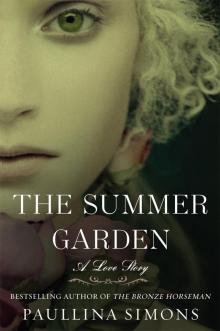 The Summer Garden
The Summer Garden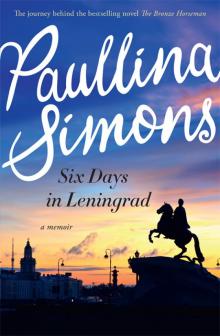 Six Days in Leningrad
Six Days in Leningrad Bellagrand
Bellagrand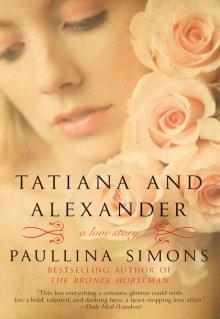 Tatiana and Alexander
Tatiana and Alexander Road to Paradise
Road to Paradise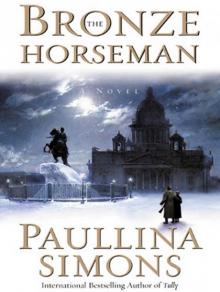 The Bronze Horseman
The Bronze Horseman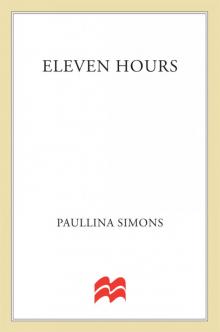 Eleven Hours
Eleven Hours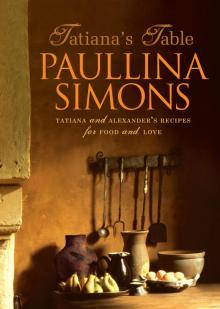 Tatiana's Table: Tatiana and Alexander's Life of Food and Love
Tatiana's Table: Tatiana and Alexander's Life of Food and Love The Girl in Times Square
The Girl in Times Square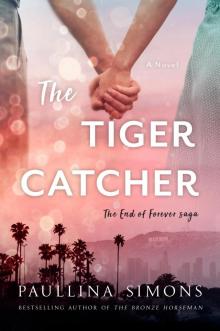 The Tiger Catcher
The Tiger Catcher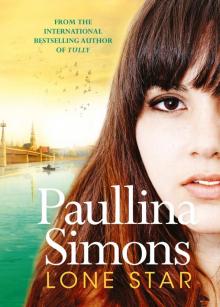 Lone Star
Lone Star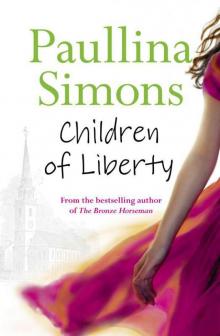 Children of Liberty
Children of Liberty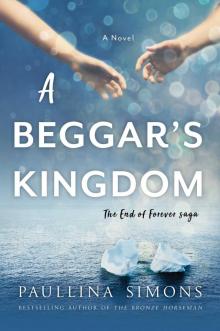 A Beggar's Kingdom
A Beggar's Kingdom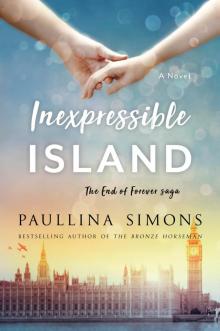 Inexpressible Island
Inexpressible Island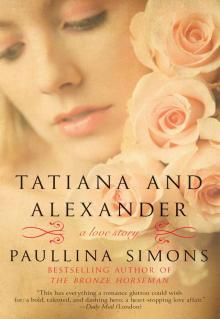 Tatiana and Alexander: A Novel
Tatiana and Alexander: A Novel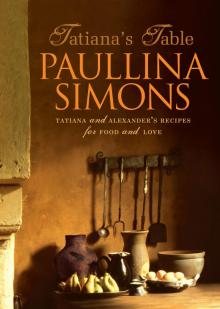 Tatiana's Table
Tatiana's Table A Song in the Daylight (2009)
A Song in the Daylight (2009)